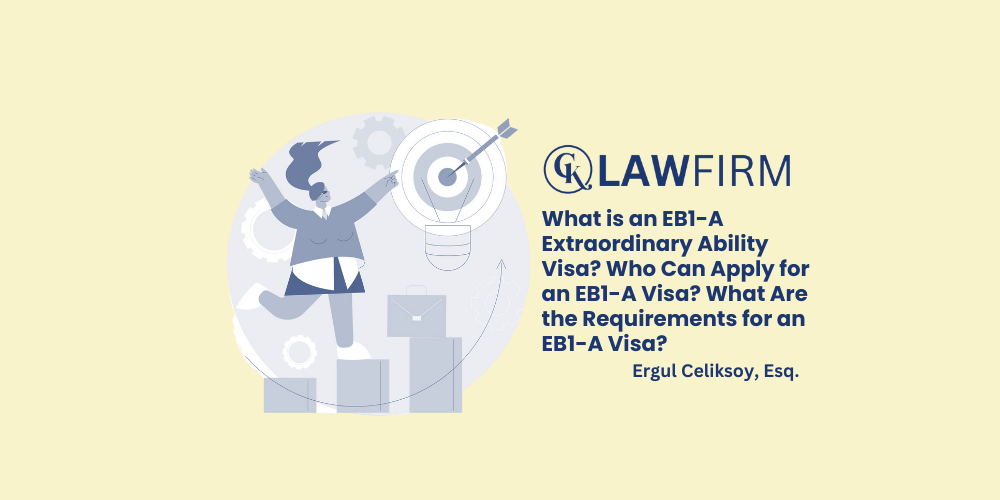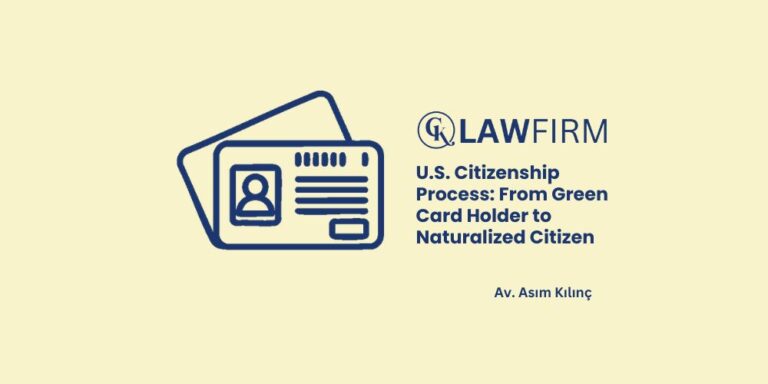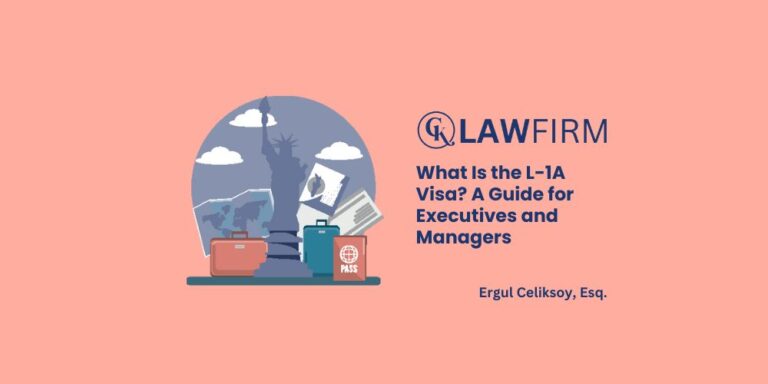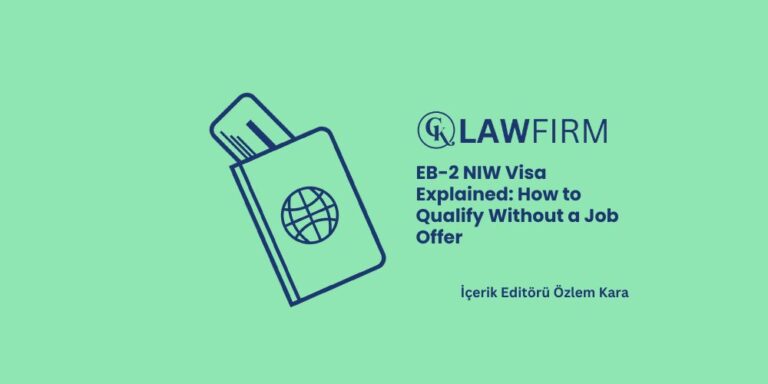Schedule an Appointment with Our Attorneys Now

What is an EB1-A Extraordinary Ability Visa? Who Can Apply for an EB1-A Visa? What Are the Requirements for an EB1-A Visa?
Learn about the EB1-A Visa, its benefits, eligibility, and requirements to apply for permanent residence in the U.S.
By Ergul Celiksoy, Immigration Attorney at CK Law Firm
In order to obtain permanent residence and work authorization in the United States, there are various types of visas available. One of these visas, which I frequently receive inquiries about, is the EB-1A Extraordinary Ability visa. Drawing from my experience handling numerous EB-1A visa cases, I will help answer some of your questions. By reading this article, you will find answers to the following questions:
- What is the EB-1A Extraordinary Ability Visa?
- What are the Benefits of Applying for the EB-1A Extraordinary Ability Visa?
- Who Can Apply for the EB-1A Visa?
- What are the Requirements for the EB-1A Visa?
- How Many Criteria Do I Need to Meet for the EB-1A Visa?
If you have further questions about the EB-1A visa, please feel free to contact me via the comments section below this article, directly through LinkedIn, or through the contact section on the website of CK Law Firm, where I am a co-founder.
What is the EB-1A Extraordinary Ability Visa?
The EB-1A visa, though named the Extraordinary Ability Visa, actually focuses more on your achievements in your field rather than pure talent. If you are highly accomplished in your area of expertise and can support this with documentation, you may apply for the EB-1A visa. Moreover, you can apply for the EB-1A visa without a job offer or sponsor.
To apply for the EB-1A visa, you need to have national or international recognition in fields such as science, arts, education, business, or athletics. This visa is designed for individuals who have reached the top level in their field or are among the top percentage of achievers.
What are the Benefits of Applying for the EB-1A Extraordinary Ability Visa?
This visa offers numerous advantages compared to other visa types, including:
- Sponsorship Requirement: You do not need an American employer to sponsor you. You can apply on your own, based on your experience and achievements.
- Job Offer Requirement: You do not need a job offer from an American employer to apply for the EB-1A visa.
- Language Proficiency Tests: You do not need to take English proficiency tests such as IELTS or TOEFL to apply for and receive approval for the EB-1A visa.
- Processing Time: Obtaining a Green Card through the EB-1A visa is faster compared to other immigration visas. If you apply with Premium Processing, you can receive a response within 15 days. After your EB-1A application is approved, there is no additional waiting period to start your Green Card process.
- Flexibility in Employment: Once you obtain a Green Card through the EB-1A visa, you have the flexibility to change your place of employment in the United States.
- Family Benefits: The spouses and unmarried children under 21 of EB-1A visa holders can also obtain Green Cards.
In addition to the above, the EB-1A visa offers many other benefits and should be considered by individuals who have achieved success in their field.
Who Can Apply for the EB-1A Visa?
To apply for the EB-1A visa, you need to have national or international recognition in fields such as science, arts, education, business, or athletics. This visa is designed for individuals who have reached the top level in their field or are among the top percentage of achievers. If you are highly accomplished in your area of expertise and can support this with documentation, you may apply for the EB-1A visa.
What are the Requirements for the EB-1A Visa?
There are two methods to meet the requirements for the EB-1A visa. Meeting one of these methods will be sufficient for your visa application to be approved. To receive approval for the EB-1A visa, you must either have received a prestigious international award in your field (e.g., Nobel, Oscar) or meet at least three of the ten criteria listed below. In practice, very few people meet the prestigious international award criterion. Therefore, EB-1A applications are generally made by meeting at least three of the criteria listed below:
- Receiving nationally or internationally recognized awards.
- Membership in associations that require outstanding achievement.
- Having been the subject of articles or media coverage.
- Participating as a judge of the work of others.
- Making significant contributions to your field.
- Publishing articles in your field.
- Having your work displayed at significant exhibitions.
- Holding a leading role in a recognized organization.
- Earning a high salary compared to others in your field.
- Achieving commercial success in the performing arts.
You do not need to meet all ten criteria for the EB-1A visa. As mentioned, meeting at least three of these criteria is sufficient. Let’s delve into each of these criteria to understand what they mean for EB1-A applications and how they can be met.
CRITERION 1: Nationally or Internationally Recognized Awards
One of the criteria for the EB1-A visa is having received nationally or internationally recognized awards in your field. These awards do not necessarily have to be the most prestigious, like the Nobel Prize. However, if you have an award given based on certain criteria to successful individuals in your field, you can use this to meet the criterion.
CRITERION 2: Membership in Associations Requiring Outstanding Achievements
Another criterion you can use to qualify for the EB1-A visa is your membership in associations that require outstanding achievements in your field. It is important to note that not just any membership will suffice. The associations must admit members based on specific criteria and evaluation by a panel. Similarly, the criteria for membership should include a high level of success in your field.
CRITERION 3: Publications About You or Your Work in National or Local Media
If there have been publications in national or local media about you or your work, you can use these for your EB1-A application. This is especially applicable if you have given interviews or if your work has been featured in news articles.
CRITERION 4: Participation as a Judge of the Work of Others
To meet the criteria for the EB1-A visa, you can also use your participation as a judge in evaluating the work of others in your field. This criterion is often met by academics who have served as peer reviewers for academic journals, advisors for doctoral or master’s students, or members of academic committees. For non-academics, being a judge on a panel evaluating work in your field can also meet this criterion.
CRITERION 5: Significant Contributions to Your Field
You can use your significant scientific, academic, artistic, athletic, or business contributions to meet the EB1-A visa requirements. It’s important to present your contributions as a whole. Emphasizing original contributions, new inventions, methods, or techniques in your field can strengthen your application. Obtaining reference letters from other experts attesting to your contributions can also be useful.
CRITERION 5: Publications in Your Field
Another criterion easily met by academics is having published articles in reputable journals in your field. If you have publications in top journals or leading publications in your field, you can use these to meet this criterion.
CRITERION 6: Display of Artistic Work at Important Exhibitions or Showcases
Artists can meet this criterion by having their work displayed at significant and prestigious exhibitions or showcases. The key point here is that the exhibitions must be well-known and respected on a national or international level. For those in the film industry, participating in national and international film festivals and winning awards can also meet this criterion.
CRITERION 7: Leadership or Critical Roles in Recognized Organizations
If you have held leadership positions in recognized and prestigious organizations in your field, you can use this for your EB1-A visa application. Simply being a manager or executive is not enough; the organization itself must be well-known and respected.
CRITERION 8: High Salary or Remuneration Compared to Others in Your Field
If you earn a significantly higher salary or remuneration compared to others in your field, you can use this for your EB1-A visa application. You need to provide evidence of the international salary standards in your field and show that your earnings are significantly higher. It’s important to note that earning more than your peers in Turkey alone is not sufficient; it must be on an international scale.
CRITERION 9: Commercial Success in the Performing Arts
You can also use the commercial success of your artistic performances for your EB1-A visa application. This criterion is applicable if you work in the arts and can document the commercial success of your works. For example, if you have sold paintings at high prices, given numerous concerts generating revenue, or if your film has had box office success, you can use these to meet this criterion.
CRITERION 10: How Many Criteria Do I Need to Meet for the EB-1A Visa?
To meet the requirements for the EB-1A visa, you need to demonstrate that you meet at least three of the ten criteria listed above with documentation. A common misconception among those researching the EB-1A visa is that they need to meet all ten criteria. To clarify, meeting at least three of these criteria is sufficient to receive approval for the EB-1A visa.
If you believe you can meet at least three of the requirements for the EB-1A visa, you can send your updated and detailed CV to info@cklawfirm.org. We offer a free evaluation to determine if you meet the necessary criteria for this visa. If we find you suitable based on our initial assessment, we will schedule a free 30-minute Zoom meeting to discuss the visa requirements and application process in detail.
Who is Attorney Dr. Ergül Çeliksoy?
Attorney Dr. Ergül Çeliksoy is a co-founder of CK Law Firm. Dr. Çeliksoy has extensive experience in U.S. immigration law. He completed his master’s degree in international law and human rights at the University of Nottingham in 2017 and began his doctoral studies at the same university. Dr. Çeliksoy completed his Ph.D. in law at the University of Nottingham School of Law in 2022, crowning his academic career. Dr. Çeliksoy has published in leading academic journals and is internationally recognized for his expertise in modern slavery, criminal justice, and criminal law. A registered member of the California Bar, Dr. Çeliksoy provides superior service to his clients with his deep knowledge and experience in U.S. immigration law cases. His knowledge and experience in immigration law contribute valuable insights to CK Law Firm’s work in this area.
Dr. Çeliksoy offers comprehensive and strategic solutions to his clients in immigration law cases, helping them secure their legal status in the United States. His work in human rights and immigration processes, along with his deep knowledge of modern slavery and criminal law, allows Dr. Çeliksoy to effectively resolve the complex legal issues faced by immigrants. Dr. Çeliksoy strengthens CK Law Firm’s leadership in immigration law by providing reliable and effective legal counsel, helping his clients build their new lives in the United States.





